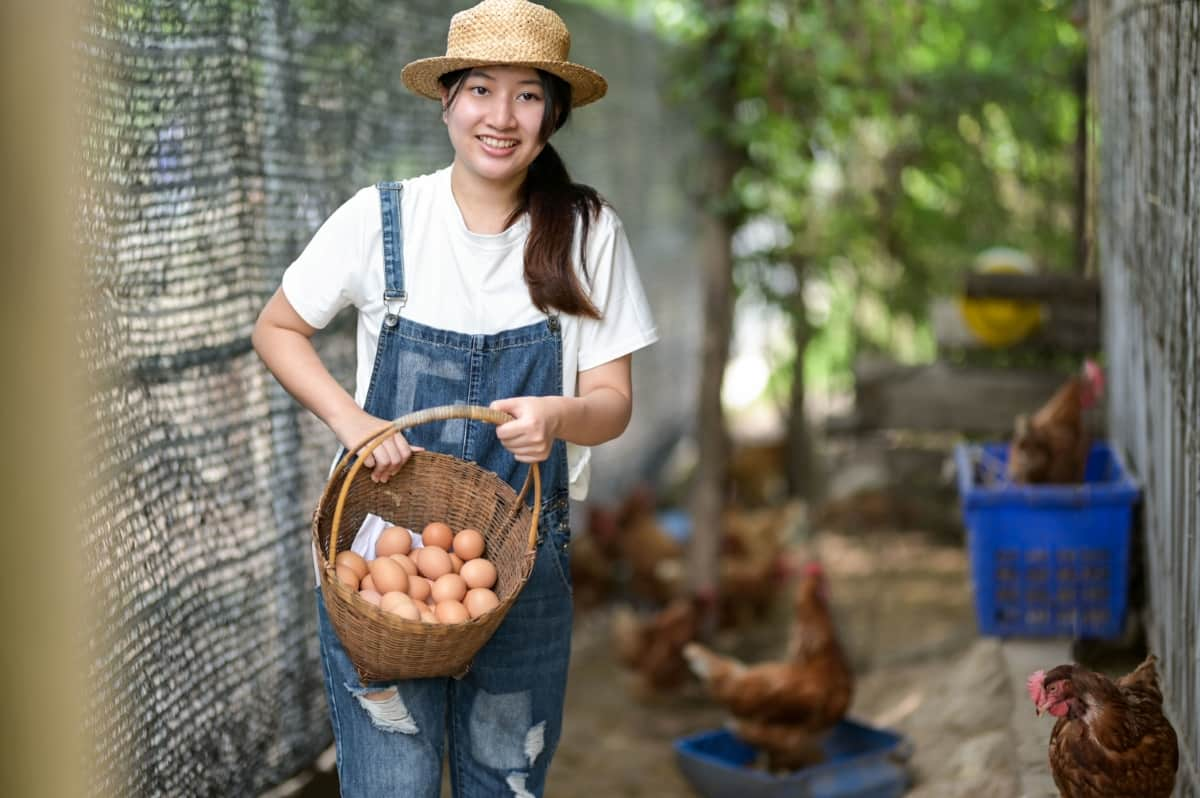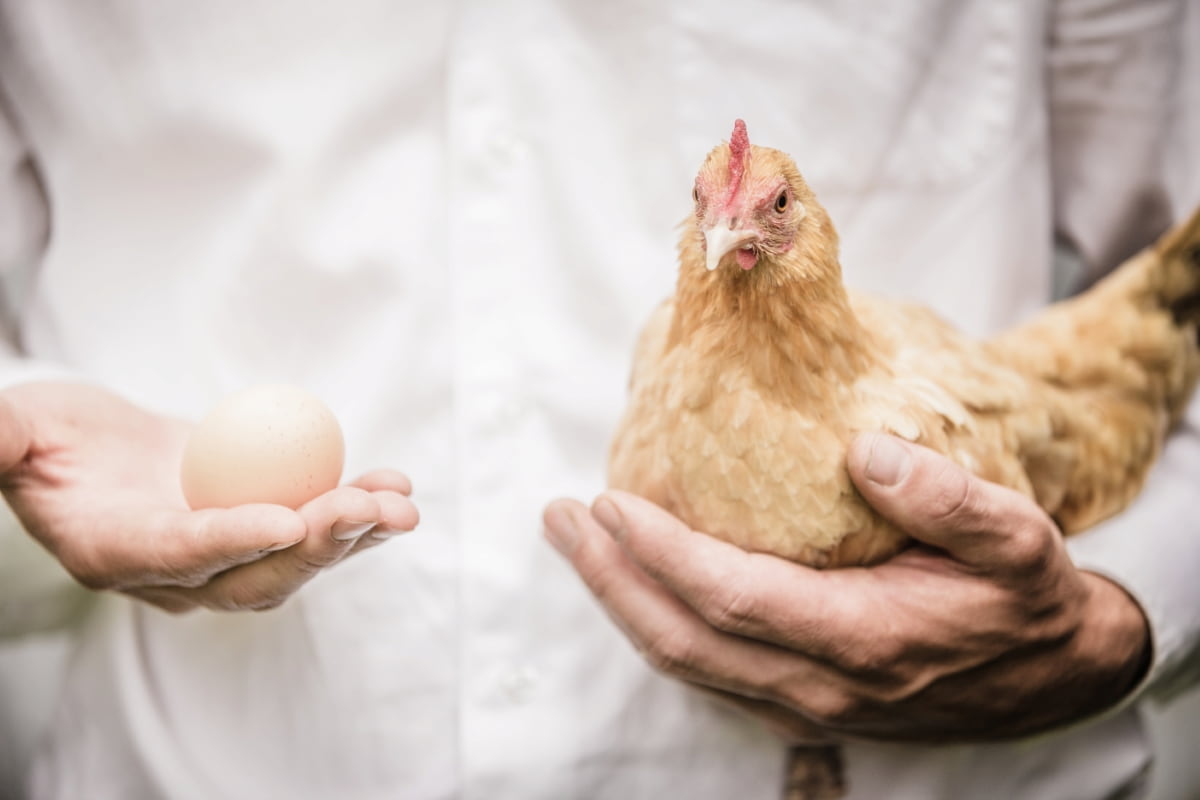Having a flock of backyard chickens provides a source of fresh, organic eggs and serves as a way of sustainable living and a hobby for many people. However, there can be times when your chickens stop laying eggs, leaving you wondering why. The reality is that many factors can influence the egg-laying habits of your flock. Here we learn ten reasons why your chickens might have stopped laying eggs and provide practical solutions to stimulate egg production.

10 Reasons Why Your Chickens Stopped Laying Eggs
Signs of Stress in Chickens Affecting Egg Production
Stress is a significant factor that can dramatically affect a chicken’s ability to lay eggs. Signs of stress in chickens can include abnormal feather loss, sudden changes in behavior, reduced feed intake, and diminished egg production. Chickens may stop laying suddenly due to many stressors, such as loud noises, predators, overcrowding, and even a dirty coop. Yes, chickens can stop laying if the coop is dirty, as they prefer a clean and safe environment to lay their eggs. To rectify this, ensure the coop is kept clean, safe, and secure to reduce stress levels and stimulate egg production.
Nutritional Deficiencies Leading to Decreased Egg Laying in Hens
Nutritional deficiencies play a significant role in reduced egg production. If your chickens are not laying eggs because of the feed, it is time to reevaluate their diet. Laying hens require a balanced diet rich in protein, calcium, and other essential nutrients for egg production. These unmet requirements could lead to malnutrition, impacting their overall health and egg-laying capabilities. To counteract this, provide them with high-quality layer feed and consider supplementing with calcium-rich treats like oyster shells or crushed eggshells.
Importance of Proper Lighting for Egg Production in Chickens
Lighting is another crucial factor that influences a chicken’s egg-laying cycle. Chickens need around 14-16 hours of light daily to maintain optimal egg production. Too little light can slow down or even halt egg production entirely. If you notice your chickens stopped laying suddenly, consider their exposure to light. This is especially crucial during the shorter days of fall and winter. If natural light is inadequate, you can install artificial lighting in the coop to supplement it and stimulate egg production.
How Changes in Temperature Impact Chicken Egg Production
Just like how humans need a comfortable living environment, so do chickens. Temperature changes can affect egg production, particularly during extreme weather conditions. You might wonder, “Why have my chickens stopped laying eggs in summer?” The answer lies in their inability to handle heat stress. Similarly, they can halt egg production in extremely cold conditions as well. To ensure consistent egg production, keep your flock comfortable by providing shade and ventilation during summer and insulation and warmth during the colder months.
The Role of Parasites and Diseases in Decreasing Egg Laying in Hens
Parasites and diseases can cause significant harm to your flock, affecting their health and, subsequently, their egg-laying capabilities. If you find a chicken stopped laying eggs and died, inspecting the flock for signs of illness or parasites immediately is essential. Worms, mites, lice, and various diseases can cause hens to stop laying. It’s crucial to maintain a regular deworming and vaccination schedule and to isolate and treat sick birds promptly to prevent the spread of disease within the flock.
In case you missed it: How to Compost Chicken Manure: A Step-By-Step Comprehensive Process Guide

Stagnant or Declining Egg Production Due to Aging Chickens
Aging is a natural process that impacts all living creatures, including chickens. As hens age, their egg production naturally declines. It’s not uncommon for older hens to gradually lay fewer eggs or stop laying altogether. While you can’t halt the aging process, knowing the age and productivity of your hens can help you manage your expectations regarding egg production. Consider introducing new, younger hens into your flock to maintain a steady supply of eggs.
Environmental Factors Affecting Egg Laying in Backyard Chickens
The environment in which your chickens live can greatly influence their egg-laying capabilities. Environmental stressors such as predators, overcrowding, or inadequate space can make hens feel insecure and stressed, leading to a drop in egg production. Therefore, providing an environment that meets their needs is essential, offering ample space, safety from predators, and proper roosting and nesting facilities. By improving their environment, you can help ensure a steady supply of eggs.
Stressful Conditions in the Coop Causing Decreased Egg Production
Chickens are creatures of habit. They prefer a calm, clean, consistent environment, especially regarding their coop. Stressful conditions within the coop, such as filth, inadequate ventilation, overcrowding, or lack of nesting spaces, can disrupt their laying cycle. As we’ve already discussed, chickens can stop laying if the coop is dirty. Hence, maintaining a clean, spacious, well-ventilated coop with enough nesting boxes is critical to keep your chickens stress-free and stimulate egg-laying.
The Impact of Molting on Temporary Cessation of Egg Laying in Hens
Molting is a natural process in which chickens lose their feathers and regrow new ones. This typically happens annually and is often linked to reduced daylight hours in the fall. If you’re questioning, “Why do chickens stop laying eggs in the fall?” molting could be the answer. During molting, chickens need to redirect their energy toward feather growth, often resulting in a temporary halt in egg production. Additional protein during this period can support feather regrowth and help resume egg production sooner.
How Improper Nesting Areas Affect Chicken Egg Production
Lastly, one of the factors that can significantly impact egg production is the quality of the nesting areas. Chickens prefer a clean, dark, and comfortable place to lay their eggs. Improper nesting areas that are too bright, dirty, or uncomfortable can discourage hens from laying. To encourage egg-laying, provide multiple nesting boxes filled with clean, comfortable bedding in a quiet, dimly lit part of the coop.
In case you missed it: Ultimate Guide to Pekin Chicken Breed: Characteristics, Feed, and Care

Conclusion
Egg-laying in chickens can be influenced by various factors, including stress, diet, lighting, temperature, health, age, environment, coop conditions, molting, and nesting areas. By understanding these factors, you can make the necessary changes to stimulate egg production and enjoy the benefits of raising a productive flock. Remember, a happy and healthy hen is a productive hen!
- Ultimate Guide to Ossabaw Island Hog: Breeding, Raising, Diet, and Care
- Ultimate Guide to Juliana Pig: Raising Facts, Size, Diet, Care, and Lifespan
- Raising Lleyn Sheep: Disadvantages, Price, Uses, Characteristics, and Care
- Ultimate Guide to Meishan Pig: Breed Facts, Breeding, Raising, and Care
- Ultimate Guide to Teacup Pigs: Raising, Diet, Lifespan, Cost, and Care
- Guide to Raising Poll Dorset Sheep: Facts, Profile, Characteristics, Uses, and Care
- Ultimate Guide to Bighorn Sheep: Characteristics, Diet, Lifespan, Breeding, and Lifecycle
- Ultimate Guide to Raising Katahdin Sheep: Farming Facts, Breed Profile, Uses, and Care
- Ultimate Guide to Raising Oreo Cows: Belted Galloways Farming Facts, Profile, Uses, and Care